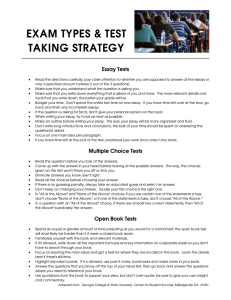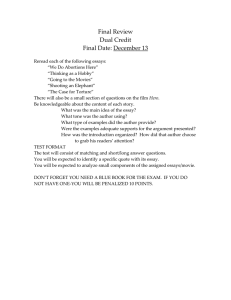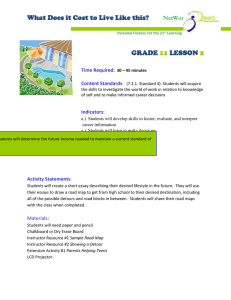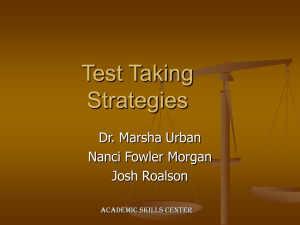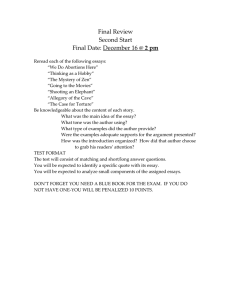Multiple Choice Test Taking Tips
advertisement
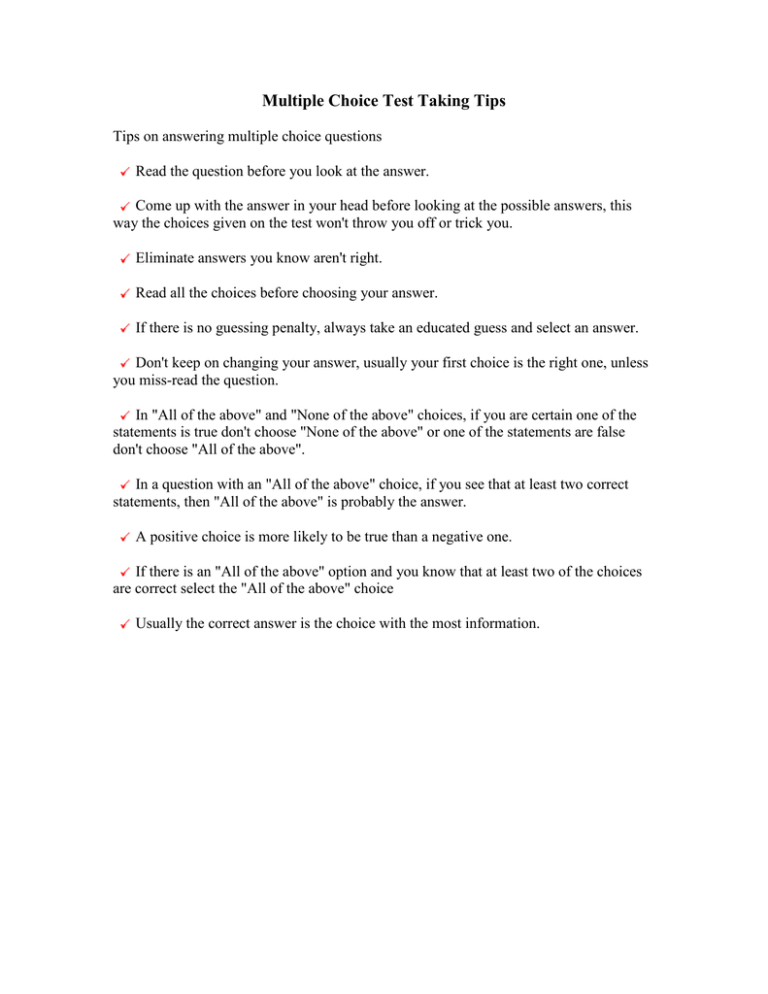
Multiple Choice Test Taking Tips Tips on answering multiple choice questions Read the question before you look at the answer. Come up with the answer in your head before looking at the possible answers, this way the choices given on the test won't throw you off or trick you. Eliminate answers you know aren't right. Read all the choices before choosing your answer. If there is no guessing penalty, always take an educated guess and select an answer. Don't keep on changing your answer, usually your first choice is the right one, unless you miss-read the question. In "All of the above" and "None of the above" choices, if you are certain one of the statements is true don't choose "None of the above" or one of the statements are false don't choose "All of the above". In a question with an "All of the above" choice, if you see that at least two correct statements, then "All of the above" is probably the answer. A positive choice is more likely to be true than a negative one. If there is an "All of the above" option and you know that at least two of the choices are correct select the "All of the above" choice Usually the correct answer is the choice with the most information. Essay Test Tips-Help Read the directions carefully; pay close attention to whether you are supposed to answer all the essays or only a specified amount (i.e. "Answer 2 out of the 3 questions). Make sure that you understand what the question is asking you, if not ask your instructor. Make sure that you write down everything that is asked of you and more. The more details and facts that you write down, the higher your grade is going to be. Budget your time, don't spend the entire test time on one essay. If the question is asking for facts, don't give your personal opinion on the topic. When writing your essay, try to be as neat as possible, neater papers usually receive higher marks. Make an outline before writing your essay. This way your essay will be more organized and fluid. If you happen to run out of time, most instructors will give you partial credit for the ideas that you have outlined. Don't write long introductions and conclusions, the bulk of your time should be spent on answering the question(s) asked. Focus on one main idea per a paragraph. If you have time left at the end proofread your work and correct any errors. Budget your time, if you have an hour to write 3 essays, spend no more than 20 minutes on each essay, then if you have time left over at the end go back and finish any incomplete essays. If you aren't sure about an exact date or number, then use approximations i.e. "Approximately 5000" or "In the late 17th century." If you make a mistake, simply draw a line through it, it is much neater and quicker than erasing it. True-False Test Tips-Help Usually there are more true answers than false on most tests. If there is no guessing penalty, guess, you have a 50% chance of getting the right answer. Read through each statement carefully, and pay attention to the qualifiers and keywords. Qualifiers like "never, always, and every mean that the statement must be true all of the time. Usually these type of qualifiers lead to a false answer. Qualifiers like "usually, sometimes, and generally" mean that if the statement can be considered true or false depending on the circumstances. Usually these type of qualifiers lead to an answer of true. If any part of the question is false, then the entire statement is false, but just because part of a statement is true doesn't necessarily make the entire statement true. Short Answer Test Tips-Help Use flashcards, writing the key terms, dates and concepts on the front and the definition, event, and explanations on the back. Try to anticipate questions that will be asked on the test and prepare for them. Usually what your instructor emphasizes in class will be on the test. Try not to leave an answer blank, show your work/write down your thoughts, even if you don't get the exact answer, partial credit is usually awarded. If you don't know the answer, come back to it after you finish the rest of the test and make an educated guess. Other parts of the test may give you clues to what the answer may be. If you can think up of more than one answer for a question, ask the instructor what to do. Read the question carefully and make sure that you answer everything that it asks for; some short answer questions have multiple parts. Oral Test Tips-Help Confirm the time and place of the test with your teacher. Find out what topics you'll be tested on and if you are allowed to bring any props, visual aids, and how you should dress. Be sure to prepare for the oral exam as you would any other exam. Anticipate questions that may be on the exam, prepare answers for the questions and then Ask/answer questions that you think might be asked with another person, preferably with someone in your class who knows the material. Practice talking in front of a mirror so that you can evaluate your body language and/or record your answers on audio tape and play it back to see how you sound or on a video tape to see how you sound and your composure. If you are using the computer or other equipment for your exam, go through it several times and make sure everything is the way you want it to be. Show up at least five minutes early so that you can gather your thoughts and not feel rushed. Being late can have an adverse affect on your grade. Turn off your cell phone and/or pager before taking the exam. Dress accordingly. Maintain good eye contact and posture, don't slouch if you're sitting or lean if you're standing. Pay close attention to the questions asked, if you don't understand the question ask for clarification or ask your instructor to repeat the question. Speak in complete sentences; try not to give one or two word answers whenever possible. Be sure to thank the instructor for his/her time when you are finished with the test. Open Book Test Taking Tips Spend an equal or greater amount of time preparing as you would for a normal test; the open book test will most likely be harder than if it were a closed book exam. Familiarize yourself with the book and relevant materials. If it's allowed, write down all the important formulas and key information on a separate sheet so you don't have to search through your book for it. Focus on learning the main ideas and get a feel for where they are located in the book, learn the details later if there's still time. Highlight important points, use post-it notes, bookmarks and make notes in your book, if it is allowed. Bring all the resources that your professor or teacher allows for. Answer the easy questions that you know off the top of your head first, then go back and answer the questions where you need to reference your book. Use quotations from the book to support your view, but don't over-quote, be sure to give your own insight and commentary.
